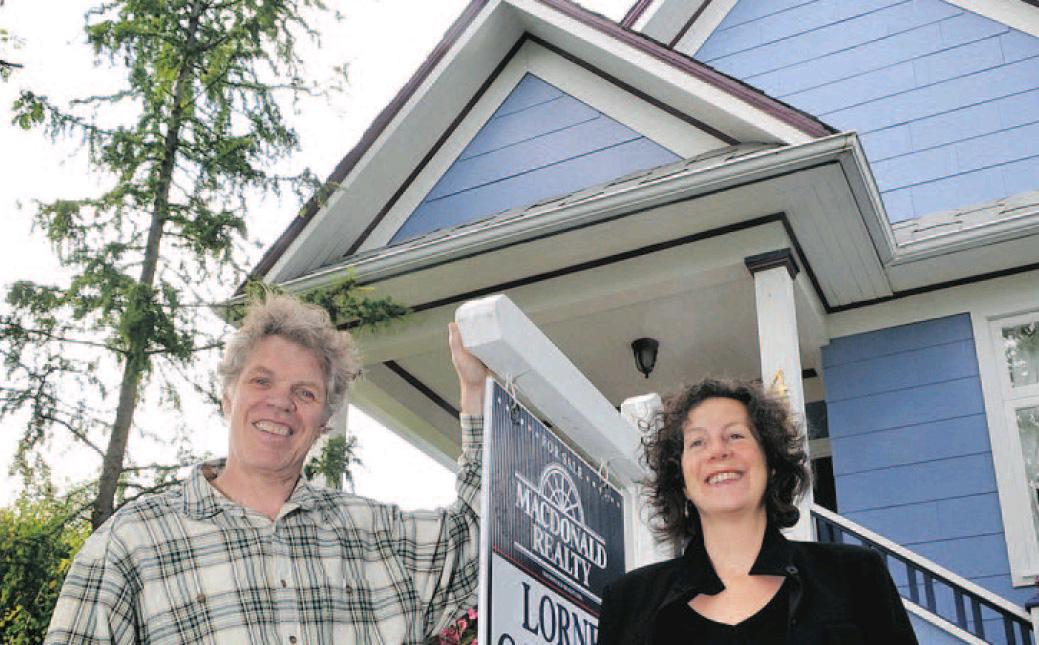Derrick Penner and Garry Marr
Sun

Steve Lott and wife Jan Fricker (with Keegan Lott, 8) are confident they will be able to sell their home near Main Street in Vancouver for nearly $900,000 despite a CREA report that says prices will decline as much as 3.5 per cent through 2011. Photograph by: Ian Lindsay, PNG, Vancouver Sun

Steve Lott an Jan Fricker are hoping to sell their 2,400-square-foot home near Main Street for $899,000 despite a predicted price drop in B.C. real estate for next year. The couple bought the house nearly 15 years ago for $270,000.
Rising interest rates, changes to lending rules and declining affordability are forcing the Canadian Real Estate Association to lower price and sales forecasts across the country, but especially in B.C.
The continuing recovery of the local property market will taper off as the year continues, the association is now predicting, and will likely see prices decline by up to 3.5 per cent through 2011.
As well, the number of houses expected to sell will be off considerably over the next 18 months.
Despite an improving provincial economy and a swift rebound in real estate prices late last year, the numbers in recent months have disappointed analysts and has led to the surprising reversal of earlier forecasts for the local market.
But both buyers and sellers remain confident they can find what they are looking for, and pockets of active listings still exist.
B.C. saw some of the biggest post-recession rebounds in real estate markets, so a recent cooling of sales in the province is a big reason the Canadian Real Estate Association revised its national housing market forecast to reflect lower sales and an easing of prices.
CREA, in its revised forecast released Wednesday, estimated B.C. sales will decrease almost six per cent to 80,000 transactions this year, a dramatic shift from the 101,900 sales in its initial forecast released in February.
Average prices, CREA estimates, will edge up 2.3 per cent this year to $476,400 before slipping back 3.5 per cent in 2011.
Nationally, CREA expects 490,600 sales through its Multiple Listing Service this year, a 5.5 per cent jump from 2009 and the second-highest number on record, but substantially off the 527,300 transactions it anticipated in its February forecast.
In a statement, CREA noted the revision “reflects a weaker-than-expected start to the year” in B.C. and developments in the mortgage market that pushed purchasers to buy homes sooner rather than later.
“They changed their forecast based on how much things have slowed down very recently,” Tsur Somerville, a commerce professor at the University of B.C., said in an interview.
The pace of sales over the last few months has slowed compared with the end of 2009 while new listings of homes for sale have increased, said Somerville, director of the centre for real estate and urban economics in the Sauder School of Business at UBC.
Cameron Muir, chief economist for the B.C. Real Estate Association, said the B.C. picture is heavily influenced by the Lower Mainland and Victoria markets, which have seen prices rebound past their previous peaks.
Now, he said, they are also the markets where buyers are being squeezed out the most because they can’t afford to buy, which also affects demand.
“The economy is improving,” Muir said. “But that’s being counterbalanced by places like Vancouver where prices are quite high.”
Somerville added that new mortgage lending rules that have tightened the requirements for borrowers to qualify for mortgages are another factor that has combined to help slow sales.
Canadians buying homes with mortgage-default insurance must now qualify based on what is called the benchmark rate for a five-year fixed-rate closed mortgage, even if they opt for terms of under five years.
The impact has been that borderline borrowers get less cash for their homes because they must qualify based on a rate that is six per cent today.
Buyers going for terms five years or longer can qualify based on the rate on their contract, which is as low as 4.25 per cent for a five-year mortgage based on discounting.
The rules have forced many consumers out of variable-rate mortgages tied to the prime rate, which even after Tuesday’s Bank of Canada rate hike, stood at 2.5 per cent.
However, the net effect, Somerville said, is a market where “buyers expect they don’t have to hurry.”
“Instead of saying, ‘I’d better buy now because maybe prices will go up,’ it’s much more, ‘I don’t have to buy now and maybe prices will go down.'”
On that point, Muir said he believes B.C.’s prices will be firmer than CREA’s forecast, but it is “a question of: ‘Are prices up a couple of percentage points or down a couple of percentage points from where they stand now?'”
CREA now says the market peaked in the fourth quarter of 2009 and predicts that by next year, on a national basis, the average price of a home sold through the MLS will be $318,300, a 2.2 per cent decline from 2010.
“With interest rates soon expected to rise, Canada is widely believed to be entering a typical demand-driven downturn due to recent prices increases and rising interest rates,” CREA’s chief economist Gregory Klump said.
© Copyright (c) The Vancouver Sun

